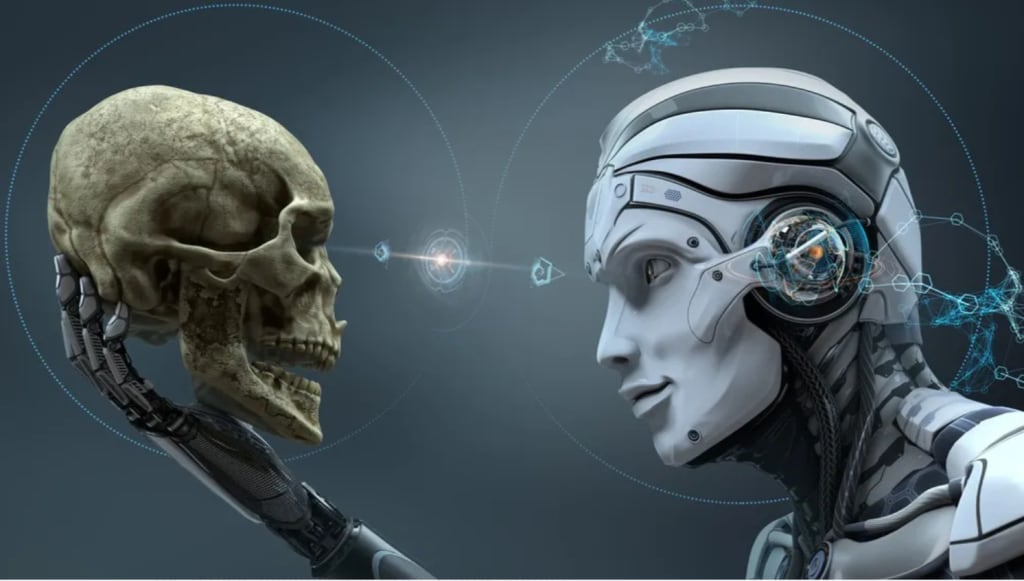Are we all in the danger of Artificial Intelligence: AI
Is AI taking over the world?

The idea of artificial intelligence (AI) taking over the world is a common theme in science fiction, but it is important to distinguish between fiction and reality. While AI has advanced significantly in recent years and continues to develop at a rapid pace, there is currently no evidence to suggest that AI is on the verge of taking over the world or posing an existential threat to humanity.
AI is a tool created and controlled by humans, and its capabilities are ultimately determined by how it is designed and utilized. While AI can automate certain tasks, analyze vast amounts of data, and make predictions, it lacks the qualities of consciousness, self-awareness, and intent that would be necessary for it to "take over" or become a dominant force in the world.
That being said, AI does bring about ethical and societal considerations that need to be carefully addressed. These include issues like privacy, bias in algorithms, job displacement, and the impact on economic and social systems. It is crucial for developers, policymakers, and society as a whole to proactively address these concerns and ensure that AI is developed and deployed in a responsible and beneficial manner.
Ultimately, the relationship between humans and AI should be one of collaboration, where AI technologies enhance our capabilities and help us tackle complex problems, rather than posing a threat to our existence.
Though AI has the potential to become dangerous due to several reasons:
1. Lack of Control: As AI systems become more advanced and autonomous, there is a concern that they may surpass human control or understanding. If AI systems make decisions or take actions that humans cannot comprehend or predict, it becomes challenging to ensure their behavior aligns with human values and objectives.
2. Bias and Discrimination: AI systems learn from data, and if the training data contains biases or discriminatory patterns, the AI can amplify and perpetuate those biases. This can lead to unfair decisions or actions, such as discriminatory hiring practices or biased criminal justice systems.
3. Adversarial Use: AI can be used for malicious purposes. Cybercriminals and hackers can exploit AI systems to conduct more sophisticated attacks, such as generating realistic phishing emails or bypassing security measures. AI-powered autonomous weapons also pose a risk if they fall into the wrong hands or are used unethically.
4. Job Displacement: The increasing automation of tasks through AI and robotics can lead to significant job displacement. This can result in economic and social disruptions, with large segments of the population facing unemployment or struggling to adapt to new job requirements.
5. Existential Risk: Some experts are concerned about the long-term impact of artificial general intelligence (AGI), which refers to highly autonomous systems that can outperform humans across a wide range of intellectual tasks. If AGI is not properly aligned with human values or if its goals are misunderstood, it could pose existential risks to humanity.
It's important to note that while AI has the potential to be dangerous, it also offers numerous benefits and opportunities for improving various aspects of our lives. It is crucial to approach AI development with responsible practices, including robust ethical frameworks, transparency, and ongoing research into safety measures
Here are some examples of potentially dangerous AI applications that have been discussed in the past:
Deepfake technology: Deepfakes refer to highly realistic manipulated videos or images created using AI algorithms. While they can have harmless applications like entertainment or digital art, they can also be misused for spreading disinformation, fake news, or for impersonation purposes.
Autonomous weapons: The development of autonomous weapons, such as armed drones or robotic soldiers, raises concerns about the potential for AI to make life-or-death decisions without human intervention. There are ongoing debates about the ethical implications and risks associated with such weapons.
AI-powered cyber attacks: AI algorithms can be used to enhance the capabilities of cyber attacks, making them more sophisticated and harder to detect. This includes AI-generated phishing emails, malware that can adapt and evolve, or AI-powered hacking tools.
AI-powered surveillance systems: Advances in facial recognition and object tracking technologies have led to the development of powerful surveillance systems. While they can have legitimate uses in public safety and security, there are concerns about privacy invasion and potential abuse by authoritarian regimes.
AI in social media manipulation: AI algorithms can be used to manipulate social media platforms by spreading propaganda, amplifying extremist content, or influencing public opinion. This raises concerns about the impact on democratic processes and the potential for AI-driven information warfare.
It's important for society to proactively address the ethical challenges associated with these technologies and ensure that AI is developed and deployed in a manner that prioritizes safety, transparency, and human well-being. Governments, researchers, and organizations are actively working on developing frameworks and guidelines for responsible AI development and deployment to mitigate potential risks.





Comments
There are no comments for this story
Be the first to respond and start the conversation.